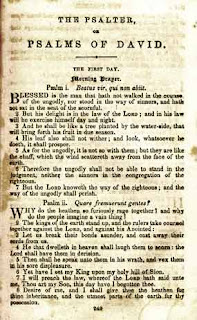 Last week a couple of theology blogs posted and reposted favorite Dorothy Day quotes. Here's the one that captured my attention:
Last week a couple of theology blogs posted and reposted favorite Dorothy Day quotes. Here's the one that captured my attention:
My strength returns to me with my cup of coffee and the reading of the psalms.As I've been living with The Book of Common Prayer I am, of necessity, living with the Psalms. During the Morning Office you read a couple of psalms. When I can, I read these aloud outside on my back porch. With a cup of coffee.
If you asked me to summarize the "message" of the Psalms, what the big recurring themes are, I'd have to say this:
1. The world is screwed up.That, at least, is what I'm taking away from the psalms. Those two themes occur over and over and over.
2. God is on the side of the little guy.
Stanley Hauerwas writes in his book The Peaceable Kingdom that the primary skill in Christian life is the skill of "seeing," the "skills of description." Some quotes from Hauerwas on this point:
The enterprise of Christian ethics primarily helps us to see.I think this is why I'm learning the love the psalms. They help me see. They train me in the skills of description.
The church serves the world by giving the world the means to see itself truthfully.
The first question we must ask is not "What should we do?" but "What is going on?"
I can only act in the world I can see.
Description frames decision.
Christian ethics, therefore, is not first of all concerned with "Thou Shalt" or "Thou Shalt Not." Its first task is to help us rightly envision the world.
This week I was a part of a bible study at a maximum security prison. I wasn't leading the class, but was asked to say a few words at the end. The group had been studying prayer. So I spoke about the psalms. One of the things I said was this:
When you pray the psalms they help you to see that the world isn't right, that something is profoundly wrong about the way the world works and operates. The psalms help us see that. More, the psalms help us say "No!" to that evil machinery. The pslams help us protest, to say "No, this isn't right. This isn't how the world should be." And that "No!" is God.


Ha! Is he suggesting that all there is to ask is about "space" and "time"? or context and history?